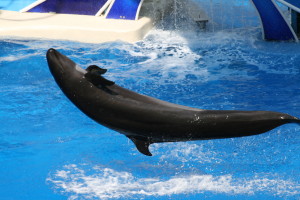 What is a false killer whale? Well, its name is misleading. The false killer whale isn’t actually related to the killer whale, but rather, it’s a member of the dolphin family. This dolphin is also known as ‘blackfish.’ In mid-January, 95 dolphins stranded themselves on a remote coast along Hog Key in the Everglades National Park. Despite rescue efforts, 82 of the dolphins died. According to the National Oceanic and Atmospheric Administration, this event is the largest mass stranding of fall killer whales ever in Florida. Many of the whales were deeply stuck in the mangroves and it was extremely difficult for rescue efforts to be successful. The last time a stranding occurred was back in 1986 when 3 false killer whales out of a group of 40 were stranded close to Cedar Key.
What is a false killer whale? Well, its name is misleading. The false killer whale isn’t actually related to the killer whale, but rather, it’s a member of the dolphin family. This dolphin is also known as ‘blackfish.’ In mid-January, 95 dolphins stranded themselves on a remote coast along Hog Key in the Everglades National Park. Despite rescue efforts, 82 of the dolphins died. According to the National Oceanic and Atmospheric Administration, this event is the largest mass stranding of fall killer whales ever in Florida. Many of the whales were deeply stuck in the mangroves and it was extremely difficult for rescue efforts to be successful. The last time a stranding occurred was back in 1986 when 3 false killer whales out of a group of 40 were stranded close to Cedar Key.
The Park has decided to leave the carcasses of the dolphins on the beach and coastline; this is a move to preserve the natural ecosystem of the area. By keeping the dolphins there, scavengers like vultures, sharks, and crabs will have an additional food source. Because of this unfortunate stranding, the Park has closed Wood Key Cove and the Hog Key backcountry campsite to ensure public safety while also protecting the area.
The dolphins are the fourth largest species of dolphin and can grow up to 20 feet long and weigh up to 1,500 pounds. They are long, slender, and dark or gray (resembling an orca whale). They have a narrow, pointed head and pointed flippers with an S-shaped elbow and a large falcate dorsal fin in the middle of their body.
False killer whales are fast moving, active, and playful. They can be found in warm to tropical waters in the Atlantic, Pacific, and Indian oceans. They primarily eat tuna, mahi-mahi, other fish, and cephalopods. Not too much is truly known about this dolphin; it usually stays in deep waters, so it hasn’t been studied a lot.
As of now, there is no definite reason for this most recent stranding, but biologists and responders from the National Oceanic Atmospheric Administration are conducting forensic evidence to figure out why this may have happened. One theory is the dolphins may have been overcome by the tide and dragged to shore.
Visit the Everglades
The Everglades is home to hundreds of species, including the false killer whale. On an airboat tour, you’ll have the opportunity to see a lot of the different wildlife in the area. To book a trip with Captain Mitch’s Airboat Tours, click here or call 800-368-0065.






